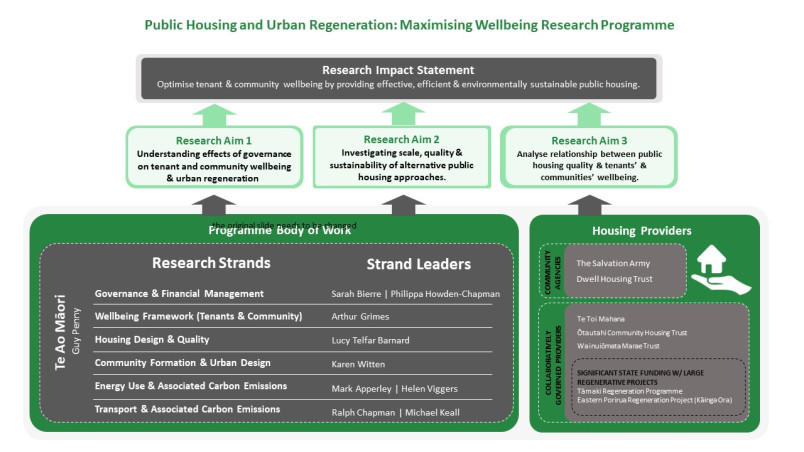Public housing and urban regeneration: maximising wellbeing
The Public Housing & Urban Regeneration Research Programme (PHUR) is a five-year MBIE Endeavour-funded research programme. We are studying and comparing seven different public housing providers’ approaches to housing and urban regeneration projects.
Our vision for this research is to improve the wellbeing of people living in public housing, their whānau and communities by providing evidence that leads to healthier and more environmentally sustainable development.
Our multidisciplinary team from several collaborating partners is led by Professor Philippa Howden-Chapman from the New Zealand Centre for Sustainable Cities, University of Otago, Wellington.

Housing stress in Aotearoa New Zealand
A shortfall of affordable and quality housing in Aotearoa New Zealand has led to a cascade of housing-related issues leading to poorer wellbeing outcomes. High housing prices and rents, increased market demand, and difficulties (such as infrastructure lags) in lifting the housing supply response have led to stress in the affordable and public housing sectors. Increased levels of household crowding, homelessness and reliance on emergency and transitional housing can reduce wellbeing.
This is a particular problem for some Māori and Pasifika households where the decline in homeownership has been the largest.
There is an urgent need for large-scale public housing developments to meet these needs, and the public housing sector is accelerating its response with increased public housing developments planned or underway.
Our research
Our research aims to provide knowledge of best public housing practice, by evaluating the ability of different housing and community development models to:
- achieve a range of positive wellbeing outcomes;
- enable socially inclusive communities and neighbourhoods;
- contribute to sustainable urban regeneration and reduce carbon footprints; and
- achieve the above elements while building efficiently and effectively at scale.
We aim to contribute to Vision Mātauranga by:
- identifying approaches that enhance whānau and community (including hapū and iwi) and hauora/wellbeing;
- including principles of Tino Rangatiratanga, active protection, equity, and options, in addition to partnership, participation and protection;
- understanding housing models that support and enable hapū, iwi and Māori urban authorities’ housing aspirations; and
- contributing to sustainable urban regeneration and reduced carbon footprints.
Wellbeing and sustainability outcomes
In the short term, the findings will provide evidence to help improve strategic public and community housing policies and support more effective allocation of government funding. In the long term, we expect that this research can help enhance wellbeing and improve environmental sustainability by guiding more effective, equitable and sustainable public housing and urban regeneration.
Partnership - Housing Providers
The Public Housing and Urban Regeneration Research Programme builds on existing partnerships between public and community housing organisations and researchers. Together we identify priorities, challenges and opportunities, and find ways to put new knowledge into practice.
Building enduring feedback loops throughout the programme enables key findings to be incorporated by housing providers and stakeholders to be put into practice in real time.

Programme structure
To achieve our three research aims, our programme includes seven research strands, led by key researchers on our team, as outlined below.

Team expertise
Our multidisciplinary team has over 25 years of research expertise in a range of areas, including:
- Healthy homes standards, e.g., temperature and ventilation, particularly for rental housing
- Communities and neighbourhoods
- Governance, policy, and practice of housing organisations
- Applying Te Tiriti o Waitangi
- Transport and associated carbon emissions
- Energy poverty
- Architecture and urban design
- Asthma, allergy, and respiratory problems associated with housing
- Health economics
- LGBTQI+ and housing
- Injury epidemiology
- Wellbeing
- Māori wellbeing and housing
- Pacific wellbeing and housing
- Homelessness
- Complex systems
Programme partners
Emplan Ltd, Front-End Solar Ltd, Kōtātā Insight, Massey University, Motu, The Connective Ltd, Tukotahi, Victoria University of Wellington, Waikato University, Wall Consultants Ltd.
For more information please contact:
The New Zealand Centre for Sustainable Cities
Email: [email protected]
Website: sustainablecities.org.nz